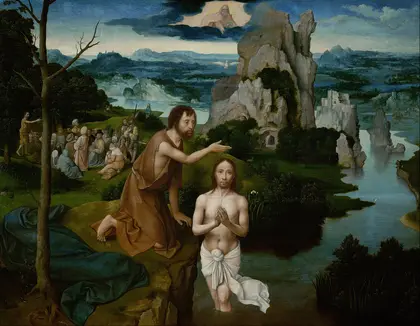The bitter cold spell has abated somewhat across Ukraine, so when Christians throughout the country take their yearly Epiphany plunges into frigid waters, the air temperature outside should be just above freezing.
All over Ukraine, believers who celebrate according to the Julian calendar commemorate the baptism of Jesus in the River Jordan on Jan. 19 at the hands of John the Baptist by reenacting it – notwithstanding the cold. It is the last holiday of Christmas season.
JOIN US ON TELEGRAM
Follow our coverage of the war on the @Kyivpost_official.
In Roman Catholicism and most other Christian denominations, Epiphany – when it became known that Jesus was divine – falls on Jan. 6 in accordance with the Gregorian calendar.
In the West, this holiday commemorates the arrival of the three wise men, or magi, at the manger in Bethlehem shortly after the birth of Jesus. Tradition holds that the wise men came by following a guiding star. When they arrived, they presented the infant, whom they recognized as divine, with gifts of gold, frankincense, and myrrh.
In the Orthodox tradition, however, emphasis is placed on the baptism of Jesus when he was already an adult. The holiday is better known as the Theophany, when God appeared in three persons as the Holy Trinity: God the Father speaking through the clouds, God the Holy Spirit descending in the form of a dove, while the God the Son, Jesus, was being baptized.
Taking the plunge
To commemorate the "appearance of God" (the etymological meaning of "theophany") Orthodox Christians and many Ukrainian Greek Catholics (predominantly in Western Ukraine and the Diaspora) reenact Christ’s baptismal immersion in the Jordan River.
In fact, the colloquial term for the holiday in Ukrainian is simply "Jordan" (Йордан)
The day before Theophany, believers are supposed to fast until the first star appears. The whole family gathers at the table just like at Christmas. For dinner, they prepare light dishes.
The main tradition of the holiday is water consecration. And not just water in churches. All sources of water, such as rivers, ponds and lakes, are subject to consecration.
In many places a hole is cut into the ice covering a frozen lake or pond, and the priest lowers a cross into it.
The belief is that holy water cleanses and has healing powers. So, on this day believers stock up on holy water for the whole year, sprinkling it judiciously in times of trouble or illness.
The more zealous believers immerse themselves directly into the water three times – defying heart attacks and frostbite.
Many people, however, perform the ritual of the ice-cold plunge not out of any devotion to Christ, but merely for the health benefits. Ice baths are beneficial in a variety of ways, from relieving sore muscles to decreasing inflammation to cleansing psychic pollution.
Some researchers, like meditation and ice-plunge advocate Aurimas Juodka, claim that regular ice baths can train the vagus nerve, which is linked with the parasympathetic nervous system. Such training can help a person deal better with stressful situations and fear.
In times of war and air raid sirens, any stress relief is more than welcome.
Baptism as near-death experience
On a symbolic level, the ritual of baptism represents a death and rebirth. Jesus was baptized shortly before he set off on his public ministry.
Some Christians, such as British biologist Rupert Sheldrake, author of Science and Spiritual Practices, feel that the original followers of John the Baptist, as well as many of the early Christians, may have actually induced a near-death experience by drowning.
According to this theory, new converts were not only cleansed of their sins by the water, they were literally drowned into experiencing the well-known "tunnel of light" that many of those who have come back from clinical death report. The experience should, in theory, lead to a rebirth of sorts.
The tradition of full immersion baptism (as opposed to sprinkling water over the head) among Born-again Christians is said to be a vestige of this drowning experience.
While such opinions remain highly speculative, the significance should not be lost on the faithful in Ukraine. This past year has literally been one of near death for the nation’s independence. And since Feb. 24, no Ukrainian has been left unchanged.
One can only pray that those who survive come out of this ordeal stronger – both physically and spiritually reborn.
You can also highlight the text and press Ctrl + Enter



